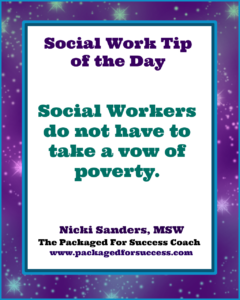Social Workers for Business? How They’re Helping the Private Sector
And It’s Not Just Corporate Social Responsibility
By Melissa Thompson
When most people think of social workers, they think of the people working in public agencies, helping individuals and families access services and live better lives. While the majority of licensed social workers do choose the nonprofit or governmental agency path, a growing number are actually putting their skills to work in the private sector.
Businesses are constantly looking for ways to improve their performance, both in terms of profits and productivity, and in employee morale. In addition, there is a growing emphasis on corporate social responsibility, especially given that businesses affect not only those who work for them, but the communities in which they operate—and beyond.
Skills That Cross Over
While the bottom line will always be of utmost importance, companies are paying more attention to interests of society in their operations, and analyzing more than just numbers when it comes to making decisions.
The analytical skills that are in demand are exactly the type of skills that social workers have. Social workers have skills in human behavior, motivation and interpersonal communication that corporations can use to better connect with not only their employees, but also with their communities.
For example, at Our Lady of the Lake University, the Master of Social Work program places a special emphasis on working with Hispanic communities. OLL University Program director Rebecca Gomez, Ph.D., LCSW notes that while Spanish is the most widely spoken foreign language in the U.S., there aren’t nearly enough social workers trained to deal with the Hispanic population and address the issues common in that population, both in the public and the private sectors. The OLL University program aims to educate social workers more effectively to work with these populations in both settings to address those issues and create better functioning communities.
But how exactly does a social worker function in the traditionally profit-focused organization?
Corporate Social Work: Building Bridges, Making Connections
Most corporate social work falls into one of two categories: internal or individual.
Internally focused social workers attempt to identify the root causes of issues in the workplace and identify solutions that improve productivity and satisfaction. For example, a social worker may investigate the reasons that employees aren’t responding to particular initiatives and try to develop new communication strategies or initiatives that are more in line with their expectations.
In one case, a social worker was tasked to determine why the company’s large population of immigrant employees was resistant to efforts to curb their working hours. By talking with them, the company learned that many of the workers were trying to work as much as possible in order to send money home to their families, and didn’t appreciate the company’s efforts to enforce work-life balance. Thanks to the social worker’s insights, the company understood the employees’ behavior in the context of their culture and motivations, and developed a compromise that satisfied both the need to maintain safety and the employee motivations.
Creating a motivated and engaged workforce is important, but with an increased focus on socially responsible business, social workers are also called upon to investigate and analyze how the company is perceived outside of its walls and why customers react to products and services the way they do.
Even companies as large as Walmart are learning that community opposition can derail even the most well-intentioned plan, and finding ways to connect and engage with the community—and the reasons for their opposition—is vital to any plan’s success. Social workers can bring these skills to the table, especially when they are trained to work with specific populations.
Even just a decade ago, the notion of social workers in the corporate space would probably have gotten you laughed out of the boardroom. However, with the focus of many businesses now on “people, planet and profits,” it’s only natural that companies are looking to social workers to provide the insights necessary to make decisions that support a healthy and socially responsible workplace.
Social work’s emphasis on diversity, safety, education, health, relationship building and community support is directly in line with corporate initiatives in these areas, and therefore adding social workers to the workforce benefits everyone, both in the company and in the community.
Article originally posted on Business.com.
